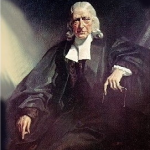What God Do You Worship? – Psalm 135:5
 As so often in the Psalms, the words of Psalm 135:5 are a call to worship.
As so often in the Psalms, the words of Psalm 135:5 are a call to worship.
כִּי אֲנִי יָדַעְתִּי כִּי־גָדוֹל יְהוָה וַאֲדֹנֵינוּ מִכָּל־אֱלֹהִים
“For I know that the Lord is great; our Lord is above all gods.”
In this verse both the personal name of God (יְהוָה) Yahweh and the term “Lord” (אָדוֹן) adon appear. In the original language the words lie side by side: as if to emphasize that it is Yahweh and none other who is Lord above all other powers.
As I understand it, the word “worship” comes from the old English term worth-ship. Worship recognizes the worthiness and power of the God we know through Jesus Christ.
Worship acknowledges that I am not at the center of the universe: God is. Worship works against narcissistic self-absorption. It says I have a Creator. It says there is One who is greater than I am. It calls me into relationship with the One who is greater than I am. It calls me into the Presence of the One who is greater than all people — and all the powers of this world.
Worship is a kind of therapy. It calls me away from my excessive preoccupation with myself. It calls me to a life of love: devotion to God and devotion to the best interests of other people. It is natural for us to be preoccupied with ourselves. We look out into the world from our own set of eyes. It must seem at first as if all the world is a show being put on just for us. But, worship reminds me that this is not so. There is a God from whom I have come — unto whom I return. And there are other people — created in the image of God — all around me. There are as much worthy of respect and consideration as I am. Worship calls me to love God and love others.
 Whatever our idea of God may be — God is always greater. Whatever our experience of God’s grace and presence may be — God is always greater. Everything has come from God. And, God is greater than the limited human mind can comprehend.
Whatever our idea of God may be — God is always greater. Whatever our experience of God’s grace and presence may be — God is always greater. Everything has come from God. And, God is greater than the limited human mind can comprehend.
The Psalms were written at a time when it was presumed that everyone believed in God — or, rather a god or gods of some sort. People served different gods. Sure. But, it was not common to suppose that there was no Higher Power of any sort. Yes, it says in Psalms 14:1 and Psalms 53:1 that fools say in their heart “there is no god.” But, I think this is intended in a moral sense: foolish people say there is no God to whom we must answer of our actions. Maybe it seems like a fine point: but the issue in these verses is moral, not strictly philosophical. Modern philosophical atheists are not necessarily “fools” in this sense. Many of them are quite moral. They don’t believe in God on philosophical grounds.
In the days of the Psalms you could assume that a person believed in a god of some sort. The question was: what god do you serve? Is it a cruel god? Is it a nationalistic god? Is it a god who is unconcerned with human well being and flourishing? Is it a god of vengeance? Is it a capricious god who chooses to send some to an eternal Hell and some to an eternal Heaven out of his own secret and eternal whim? Or is it a God who embodies love, mercy, faithfulness, compassion and justice?
Followers of a monstrous god are likely to become monsters themselves. The god you serve will be reflected in your life. Praying to a cruel god will not bring peace. Thomas Paine once said: “Belief in a cruel God makes a cruel man.”
The Israelites knew a God who was a “compassionate and gracious God, slow to anger, abounding in love and faithfulness…” (Exodus 34:6). The hard thing for them — and for us! — is to comprehend a God of grace. Slowly, through time, they came to understand better and better.
 And, they knew that their God — the God who had called Abraham, Isaac and Jacob — was above all other gods. The God of love and faithfulness and redemption and justice is the only One worthy of praise and service. Notice the wording. It is like this: “I know that great is Yahweh, the Lord (adon) over all gods (elohim).”
And, they knew that their God — the God who had called Abraham, Isaac and Jacob — was above all other gods. The God of love and faithfulness and redemption and justice is the only One worthy of praise and service. Notice the wording. It is like this: “I know that great is Yahweh, the Lord (adon) over all gods (elohim).”
It would seem, in an age of skepticism, that all believers in God are somehow bound together. Not so. Not really. The question is the same now as ever: what god do you serve?
Yes. There are atheists. Yes, some of them are quite vocal in our time — and some are quite active on the Internet. But, some of them are atheists today because they were raised in an oppressive religious environment. They have shaken off the oppressive god they were taught — in order to embrace freedom and learning and justice and compassion. For many, it feels better to have no God than to have the god under whom they were raised. So, their was once and atheist slogan that said: “There Is No God. Now Stop Worrying. And Enjoy Your Life.” It seems to them that God is the source of worry and fear and unhappiness.
I don’t want to serve a god who is a source of worry and fear and unhappiness, either.
But, I can’t help but feel: serving a negation is not ultimately satisfying, either. We are born to ask questions, to try to put together something of the Big Picture of life and meaning and morality. We are here for a purpose. Even science itself seems to tell us that. So, what does it all mean? And, the Bible answers to this longing for meaning with a story: the story of a loving God who sent His Son to redeem us and bring to our brief and transitory lives an eternal hope!
 Traditionally, this is why those of us in the Wesleyan tradition have objected to the more extreme and deterministic versions of Calvinism. It seems to us like an attack on the character of God. We are not okay with the idea of a Limited Atonement — only for a predetermined elect. Why? It undermines the notion that God’s love is for everyone. (See: Calvin on John 3:16). This was one of John Wesley’s primary objections to Calvinism. It makes God seem monstrous and capricious, rather than loving and merciful.
Traditionally, this is why those of us in the Wesleyan tradition have objected to the more extreme and deterministic versions of Calvinism. It seems to us like an attack on the character of God. We are not okay with the idea of a Limited Atonement — only for a predetermined elect. Why? It undermines the notion that God’s love is for everyone. (See: Calvin on John 3:16). This was one of John Wesley’s primary objections to Calvinism. It makes God seem monstrous and capricious, rather than loving and merciful.
Theology matters. Our conceptions of God are spiritually formative. They shape us. A harsh, authoritarian, judgmental, capricious, demanding God will produce harsh, authoritarian, judgmental, capricious, demanding people. This is not a small issue.
For many people God is harsh and demanding — a taskmaster that is never satisfied. And, as a result, they carry around an unresolved burden of guilt. They can never be good enough. They can never do enough.
I don’t want to think like that. I don’t want to be like that.
Am I serving the Father of our Lord Jesus Christ today? Am I serving a God of justice, mercy and love? Am I seeking to balance those virtues in my life? For if the God of Jesus Christ is truly “Lord is above all gods” then the power of the Holy Spirit is the greatest power in this world — the power of God’s love is greater than any earthly power.
Lord God
God of Abraham, Isaac and Jacob
Father of our Lord Jesus Christ
a God merciful and gracious,
slow to anger,
and abounding in steadfast love and faithfulness
I worship You today.
May there be no false God in my affections.
May there be no false God in my life.
Teach me the way of mercy.
Teach me the way of loyalty and faithfulness.
Teach me to forgive.
Restrain my anger — even when it is just.
Teach me patience.
Grant that my life — today — will reflect the good and merciful God whom I serve,
Through Jesus Christ, the Lord. Amen.










1 Response